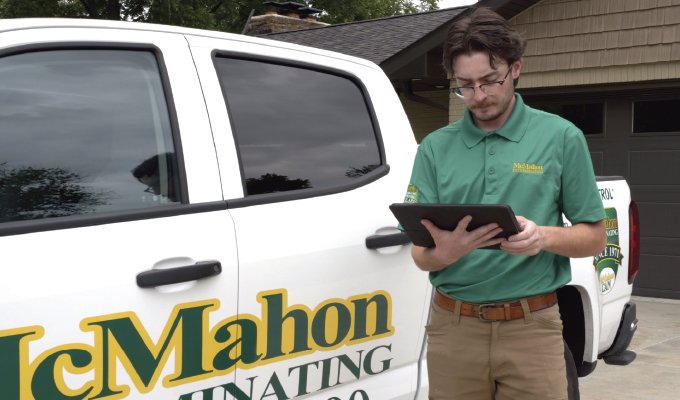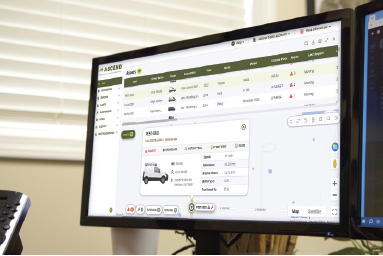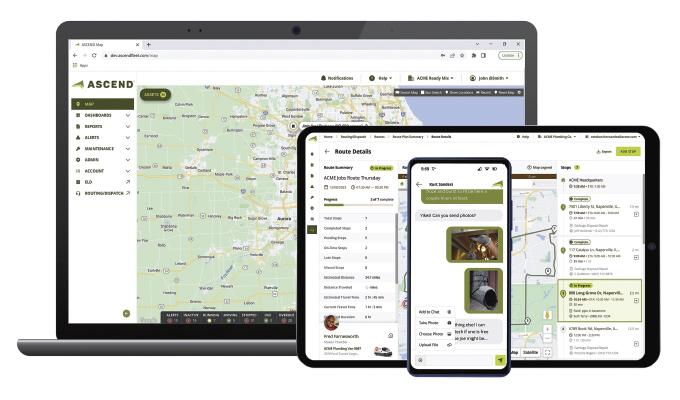From spiders to bed bugs to ticks, fleas, and lice, North America’s pest management industry has its hands full in meeting the needs of today’s homeowners and commercial businesses. The industry is growing at better than a 5% annual rate thanks to a variety of factors, including increasingly severe weather events, a decade of near-record homebuilding activity, urbanization, and the proliferation of pests that can impact public health.
While there has been much consolidation in the industry, a vast majority of consumers in the US and Canada are still served by multi-generation family-owned pest management firms. And the reasons are simple: health and safety threats from pests are personal, and well-established local/regional players have built strong, enduring personal relationships with their clients—relationships based on service, trust, and accountability.
“I think customers place greater trust in successful locally owned businesses,” says Charlie McMahon, owner and president of McMahon Exterminating, an Evansville, Indiana, based company that has expanded its footprint as far as 50 miles to the north in Vincennes, Indiana, and 125 miles to the east in Louisville, Kentucky. Founded by McMahon’s father in 1971, the business has grown from six technicians in 2010 to 30 today.
A TRANSPARENT EXPERIENCE
Consumers don’t want to encounter pests at home or at work. They expect pest management professionals to prevent such encounters regardless of whether their services are provided when the property owner is on the premises or not. The transparent nature of scheduled service calls raises the trust issue—can the customer be certain the services paid for were in fact performed?
This question has led McMahon and a growing number of other pest management firms to leverage GPS fleet technology and other solutions to confirm the locations of technician vehicles throughout the day. Although Charlie McMahon says he has rarely had a customer ask for proof of a service call, it is nonetheless important to document every stop to establish and maintain customer confidence and trust.
In addition to ensuring accountability, GPS and other fleet management technologies help service businesses meet the needs of a growing universe of customers faster, more efficiently, and with greater safety. Routing, dispatch, maintenance tracking, driver behavior monitoring, and other business-critical functions are now widely available—and surprisingly affordable—for even comparatively small enterprises.
But just as accountability is a defining characteristic of strong customer relationships in the pest management market, it must also extend to the suppliers these businesses rely on.

ACCOUNTABILITY GAP
Trust is the cornerstone of McMahon Exterminating’s value proposition. Fittingly, it also guides Charlie McMahon’s employee relationships. “I’m very upfront with my team about my faith, and I’m very upfront about my trusting of them and their ability to trust me,” he says.
But trust was an issue for McMahon when dealing with a previous fleet telematics provider. “They had zero customer service,” he explains. “I had a truck stuck in ‘tow’ mode (in the provider’s solution) for six months. I had made multiple phone calls and sent multiple emails trying to get somebody to reach out to me.”
These frustrations led him to explore other options, one of which was ASCEND, an emerging US-based brand launched by successful, longtime provider of “white label” technology solutions. Based on its success selling to other providers, ASCEND has invested in its own brand and support organization for fleet and equipment operators across North America and reached out to McMahon along with other mixed-fleet operators who have likely encountered the aggravating customer service shortcomings of other providers.

Charlie McMahon’s experiences with ASCEND have erased his memories of his past technology supplier, and he happily recommends the company’s technology and customer-focused people to anyone who asks. “ASCEND team members actually reach out to me to make sure everything is going okay and ask if I would like additional training,” he explains. “And when I call them, I’m talking to a real person who quickly provides the answer I’m looking for.”
The good news for other business operators is that changing to a better technology provider needn’t be a hassle. McMahon’s entire fleet of service vehicles was converted to ASCEND in just a matter of days, and the company’s US-based customer service specialists helped Charlie McMahon quickly master the solution’s broad capabilities.
GROWING BEYOND
The benefits of fleet management technology continue to grow for small, mid-size, and enterprise businesses, virtually regardless of the types of vehicles and equipment they operate. It’s more than simply a matter of knowing where and how an asset is being used at any given moment—with ASCEND, fleet operators can increase customer service levels, vehicle uptime, and employee productivity and loyalty while reducing fuel and maintenance expenses, eliminating safety risks, and cutting insurance costs. But the key, as Charlie McMahon and others are quick to mention, is finding a provider that is as committed to your success as you are. For McMahon and a growing number of other users, that “right” provider is ready and eager to answer your call.
ABOUT THE AUTHOR
Gary Young is a business writer with more than 30 years of experience covering the fleet management, vehicle maintenance and operation, industrial, financial, and technology sectors. He is based in Columbus, Ohio. Find out more, visit www.ascendfleet.com.




